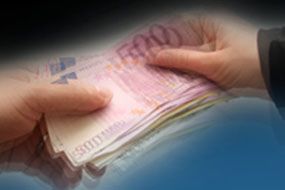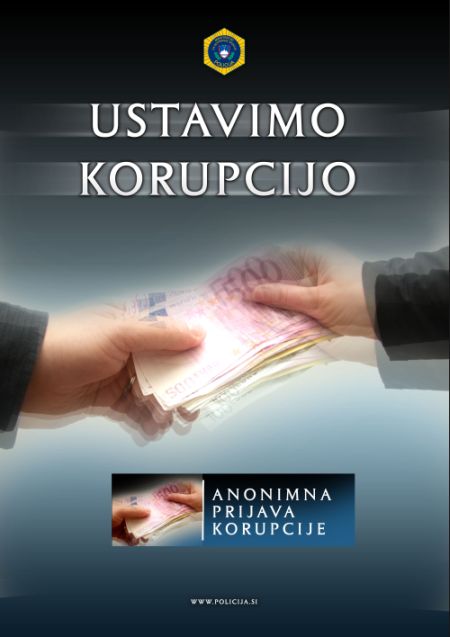As of today, the Slovenian police have established the possibility of a totally anonymous e-report of corruption offences. Namely, in the area of investigation of corruption, countries and international institutions must cooperate, while the cooperation of individuals is also highly important. We shall be more successful in combating corruption together!
If you are acquainted with any form of corruption offence, report it," invited the citizens at today's press conference the Assistant Director of the Criminal Police Directorate, Robert Črepinko.

He explained that by establishing the e-report of corruption the police would like to encourage citizens to cooperate, encourage reporting of such criminal offences to the police, increase the efficiency of collecting information, provide anonymity of e-report and make use of the existing technical solutions of the police and state administration.
To ensure the anonymity of e-report, the involvement of a third organization must be ensured (e-government) that will ensure that when communicating anonymous reports to the police, data on the notifier will not be required as well as data that would show the IP number of a computer, from which the report was filed.
Therefore, this is an alternative solution, which supplements the possibility of reporting anonymous messages to the anonymous police phone 080-1200.
Experience of police work frequently shows that victims do not report all criminal acts, while witnesses often are not prepared to reveal specific information to the police. The most frequent reason is the "dark criminality field" - fear of perpetrator's revenge or long-lasting court proceedings.

The following corruption acts are illegal: promising, requesting, giving, and taking a reward, gift or some other form of benefit.
Therefore - if you are acquainted with any form of corruption offence, report it!
Corruption offences can now be reported by any person through the website e-reports of a corruption offence . The person must fill out a web form, which is automatically electronically forwarded to the police.
![]()
The Criminal Police Directorate will thoroughly examine each report as well as act properly according to the given indications of a criminal offence.
The report is anonymous; therefore, you don't have to write down your personal data or even your electronic mail address. However, if you would like to personally provide us assistance in considering the matter, you may to notify us and indicate your personal data.
A user also doesn't require a digital certificate. The report is free-of-charge and also enables various attachments.
For our consideration of your report, it will be helpful, if you consider the following questions when giving facts: What happened? When did it happen? Where did it happen? How did it happen? In what way did it happen? Who is the perpetrator? Why did the perpetrator commit this act?
In a similar way, you can report any criminal offence through the police intervention phone number 113; if you would like to remain anonymous, you can use the anonymous police phone 080 1200.

About corruption
In practice there are various definitions of corruption, which on one hand consider the social and political ingredient, and on the other its economic or organizational ingredient. Therefore, corruption cannot be equated merely with its criminal law definition; its definition is wider. The regulations that determine corruption are based primarily on moral grounds on fairness and impartiality of public servants and persons with public authorization
Corruption has several specific manifestations - from extortion, blackmailing, fraud, falsity to nepotism; it always presents a two-way transaction: on one side, the bidder of the bribe, and on the other side its recipient.
The fact is all forms of corruption are not harmful in the same way; however, each one of them undermines the regulations and has destructive effects on the economic and political development of a country.
The Slovenian Penal Code provides both an opportunity and encouragement for the bribe giver in order that the court doesn't punish him if he reports the act prior to its disclosure (valid only for Articles 242 and 262 of the Penal Code-1).

